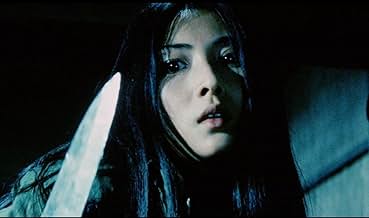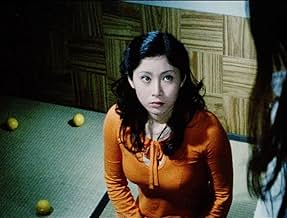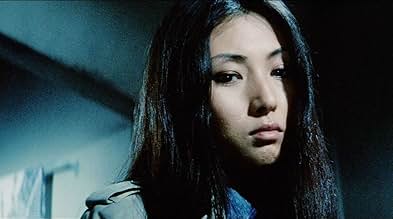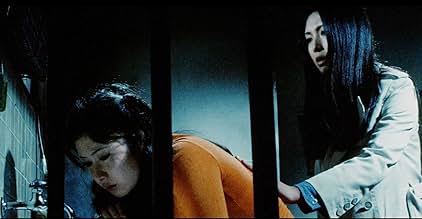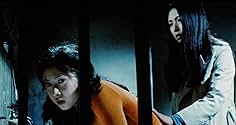IMDb-BEWERTUNG
7,0/10
2353
IHRE BEWERTUNG
Füge eine Handlung in deiner Sprache hinzuMatsu is sheltered by an incestuous prostitute on her run from the police, her ex-prison mate and a cop whose arm she hacked off.Matsu is sheltered by an incestuous prostitute on her run from the police, her ex-prison mate and a cop whose arm she hacked off.Matsu is sheltered by an incestuous prostitute on her run from the police, her ex-prison mate and a cop whose arm she hacked off.
Empfohlene Bewertungen
This is Shunya Ito's final entry in the FEMALE CONVICT SCORPION series, starring the great Meiko Kaji. The series, based on a Japanese manga, follows the exploits of a woman unjustly imprisoned, brutalized by guards and fellow inmates, who defends herself with such aplomb, she becomes a jail-house legend. The other convicts nickname her Sasori, which means Scorpion. Over the course of two films, she escapes to wreak vengeance against the man who got her busted, is sent back for his murder, and escapes again; the second film ends with Sasori on the loose.
This, the third film, focuses on Sasori's life as a fugitive outside the walls. In an eye-opening first scene, Sasori evades detectives on a subway train; she comes out of it handcuffed to one of the detectives' arms, but not the rest of him. She flees to a slum which consists of a red-light district run by a forced-prostitution ring and a residential area made up of a mud street and shacks, where she is put up for the night and befriended by a lonely prostitute named Yuki. We soon discover that Yuki gives of herself on a nightly basis to her brain-damaged brother, who she keeps locked in a closet. Sasori tries to lead a normal life, taking a job as a seamstress and renting her own apartment, but she and Yuki soon meet again and are both embroiled in a plot that involves the Cruella De Ville-from-hell madam who runs the prostitution ring and the detective from the subway (Mikio Narita, a regular in Kinji Fukasaku films), who by God wants his arm back.
What follows is an atmospheric noir/horror yarn--it takes elements from both and uses them well--that applies Ito's flair for the visual to a mood that is different from the first two SCORPION films, yet bears the same unmistakable signature. A scene involving lit matches falling into a sewer tunnel is especially beautiful. Ito's use of sound, like when Sasori is incessantly scraping the handcuffs with the arm against a tombstone in an attempt to free herself, is as effective here as ever. He also employs silence more than usual, as if by virtue of a newly honed minimalism. This goes along with the relatively subdued tone of the first section of the film, which allows space to explore Sasori's and others' characters. Things pick up by the end, though it's all handled with a dreamier rhythm than the previous films. This is an asset. Each of the three films has its own style, I realize now, and seeing this one made me go back and watch the first, appreciating it more than before.
Meiko Kaji gives her usual amazing performance as Sasori, emoting silently, standing or moving or pouncing or maiming with a grace that switches seamlessly between human and animal. The pathos present in all three films is largely due to the human side of this grace, which never inhibits the films' darker aspects. Reportedly, Kaji, who did one more SCORPION film after this one, had as much to do with developing the character for film as Ito, not only in her performances, but off-camera as well. This film is a worthy swan song for the collaboration. Very Japanese, very seventies, very much something else entirely.
This, the third film, focuses on Sasori's life as a fugitive outside the walls. In an eye-opening first scene, Sasori evades detectives on a subway train; she comes out of it handcuffed to one of the detectives' arms, but not the rest of him. She flees to a slum which consists of a red-light district run by a forced-prostitution ring and a residential area made up of a mud street and shacks, where she is put up for the night and befriended by a lonely prostitute named Yuki. We soon discover that Yuki gives of herself on a nightly basis to her brain-damaged brother, who she keeps locked in a closet. Sasori tries to lead a normal life, taking a job as a seamstress and renting her own apartment, but she and Yuki soon meet again and are both embroiled in a plot that involves the Cruella De Ville-from-hell madam who runs the prostitution ring and the detective from the subway (Mikio Narita, a regular in Kinji Fukasaku films), who by God wants his arm back.
What follows is an atmospheric noir/horror yarn--it takes elements from both and uses them well--that applies Ito's flair for the visual to a mood that is different from the first two SCORPION films, yet bears the same unmistakable signature. A scene involving lit matches falling into a sewer tunnel is especially beautiful. Ito's use of sound, like when Sasori is incessantly scraping the handcuffs with the arm against a tombstone in an attempt to free herself, is as effective here as ever. He also employs silence more than usual, as if by virtue of a newly honed minimalism. This goes along with the relatively subdued tone of the first section of the film, which allows space to explore Sasori's and others' characters. Things pick up by the end, though it's all handled with a dreamier rhythm than the previous films. This is an asset. Each of the three films has its own style, I realize now, and seeing this one made me go back and watch the first, appreciating it more than before.
Meiko Kaji gives her usual amazing performance as Sasori, emoting silently, standing or moving or pouncing or maiming with a grace that switches seamlessly between human and animal. The pathos present in all three films is largely due to the human side of this grace, which never inhibits the films' darker aspects. Reportedly, Kaji, who did one more SCORPION film after this one, had as much to do with developing the character for film as Ito, not only in her performances, but off-camera as well. This film is a worthy swan song for the collaboration. Very Japanese, very seventies, very much something else entirely.
I thought "Female Prisoner #701: Scorpion" was an awesome exploitative adventure filled with over-the-top violence and a revenge story that made me want to cheer. "Female Prisoner Scorpion: Jailhouse 41" continued Matsu the Scorpion's (Meiko Kaji, "Lady Snowblood") journey in a way that artistically expanded the world established in the first film while still giving us a compelling story that furthered the legend of our titular character. This third entry is the last of the FPS series directed by Shun'ya Ito, and while I can't say that it's as much fun as the previous entries in the series, I can say that fans of the first two films will probably still find a lot to enjoy in this movie: there are plenty of sleazy and exploitative scenes that justify the sequences of over-the-top graphic violence, and the way the film approaches that violence is still pretty artistic, and, of course, Matsu still has her sting.
I have been looking forward to the release of this DVD (and it's follow-up {Female Prisoner Scorpion: #701's Grudge Song}) for some time. I very much enjoyed the first two movies of this series. After just watching this film, I would have to say that this is probably my favorite of the three.
All three of these movies were directed by Shunya Ito. What is great about them, though, is that, even though they all feature the same lead character (wonderfully played by Meiko Kaji), they are each vastly different from the others.
The first movie (Female Prisoner #701: Scorpion) is more or less a typical Women In Prison movie. But the character of Scorpion is very intriguing - very reminiscent of the anti-heroes of many spaghetti westerns. And the director often used some very interesting and unusual visual approaches to the material.
The second movie (Female Convict Scorpion: Jailhouse 41) is a real tour-de-force. Not so much a WIP movie as the bulk of the film has Scorpion and six other escaped inmates on the lam.
This movie (Female Prisoner Scorpion: Beast Stable) is the third in the series and the last one directed by Shunya Ito. This one plays out as much more of a crime drama. Once again, our heroine is on the run. But this time out, she has managed to maintain a certain amount of normalcy in her life (relatively speaking anyway). She gets a job, she finds a place to live, she makes a friend on the outside. But, of course, everything has to unravel eventually. FPS: Beast Stable has a more straight-forward story that is told at a more leisurely pace than its predecessors. But I found it to be engaging from beginning to end. And don't worry: there is still plenty of depravity to go around in this movie! But I think these movies transcend most exploitation films because the more disturbing elements are played in a straighter tone rather than being used exclusively for in-your-face shock value. Yes, there were definitely moments in this movie where I cringed mightily. But I didn't feel that they detracted from the value of the story (well, maybe a time or two). One thing I have greatly enjoyed about these films is the continued build-up of Scorpion's mythos. With this entry character development is used much more extensively than in the previous two. We get to see that she is much more than just a stone-hearted vengeful badass!
As I mentioned earlier in this review, a fourth movie followed. It also features Meiko Kaji as Scorpion but had a different director. Without giving anything away I want to mention that FPS: Beast Stable ends in such a way as to make a sequel completely unnecessary. The fourth film is still quite good but it seems to play as a superfluous footnote to a mind-blowing trilogy.
I would highly recommend this movie to anyone interested in out-of-the-ordinary films. FPS: Beast Stable can be enjoyed as a stand-alone piece (as can the first two movies) but I would also recommend watching the others first if you have not already done so.
All three of these movies were directed by Shunya Ito. What is great about them, though, is that, even though they all feature the same lead character (wonderfully played by Meiko Kaji), they are each vastly different from the others.
The first movie (Female Prisoner #701: Scorpion) is more or less a typical Women In Prison movie. But the character of Scorpion is very intriguing - very reminiscent of the anti-heroes of many spaghetti westerns. And the director often used some very interesting and unusual visual approaches to the material.
The second movie (Female Convict Scorpion: Jailhouse 41) is a real tour-de-force. Not so much a WIP movie as the bulk of the film has Scorpion and six other escaped inmates on the lam.
This movie (Female Prisoner Scorpion: Beast Stable) is the third in the series and the last one directed by Shunya Ito. This one plays out as much more of a crime drama. Once again, our heroine is on the run. But this time out, she has managed to maintain a certain amount of normalcy in her life (relatively speaking anyway). She gets a job, she finds a place to live, she makes a friend on the outside. But, of course, everything has to unravel eventually. FPS: Beast Stable has a more straight-forward story that is told at a more leisurely pace than its predecessors. But I found it to be engaging from beginning to end. And don't worry: there is still plenty of depravity to go around in this movie! But I think these movies transcend most exploitation films because the more disturbing elements are played in a straighter tone rather than being used exclusively for in-your-face shock value. Yes, there were definitely moments in this movie where I cringed mightily. But I didn't feel that they detracted from the value of the story (well, maybe a time or two). One thing I have greatly enjoyed about these films is the continued build-up of Scorpion's mythos. With this entry character development is used much more extensively than in the previous two. We get to see that she is much more than just a stone-hearted vengeful badass!
As I mentioned earlier in this review, a fourth movie followed. It also features Meiko Kaji as Scorpion but had a different director. Without giving anything away I want to mention that FPS: Beast Stable ends in such a way as to make a sequel completely unnecessary. The fourth film is still quite good but it seems to play as a superfluous footnote to a mind-blowing trilogy.
I would highly recommend this movie to anyone interested in out-of-the-ordinary films. FPS: Beast Stable can be enjoyed as a stand-alone piece (as can the first two movies) but I would also recommend watching the others first if you have not already done so.
After finishing the Zero Woman series, I was looking forward to the Female Prisoner Scorpion series; both based upon comics by Tooru Shinohara. Unfortunately, I was not able to see them in order, as this is the third in the series.
It starts great as The Scorpion (Meiko Kaji) is escaping from the police. Detective Kondo (Mikio Narita) did manage to get a cuff on her, but she proceeded to cut off his arm and get away. If that isn't bad enough, later on a dog digs up the arm and is seen trotting down the street before finding a place to enjoy his treat.
Scorpion might as well go back to prison as life is no picnic on the outside. First, a local Yakuza Tanida (v) threatens to put her back if she doesn't put out; and then the gang leader gets her when she gets rid of Tanida. But, they don't hold her for long before she escapes and is looking for vengeance.
Soon they are dropping like flies. Some certainly deserved it for wearing garish outfits with shirt collars so big they went all the way to the shoulder. The madam (Reisen Lee) turns herself in to avoid getting killed.
The police arrive at her latest kill and trap her in the sewer. She's in there for a week and the cops find out that a friend (Yayoi Watanabe) has been supplying her with food. (The story O Yuki (Watanabe) and her brother is a subplot that is very interesting, but only incidental to the movie.) They try to burn her out, but this is The Scorpion, and she has some unfinished business.
Not the usual mix of sex and violence, this is a slow tale that is beautiful throughout.
It starts great as The Scorpion (Meiko Kaji) is escaping from the police. Detective Kondo (Mikio Narita) did manage to get a cuff on her, but she proceeded to cut off his arm and get away. If that isn't bad enough, later on a dog digs up the arm and is seen trotting down the street before finding a place to enjoy his treat.
Scorpion might as well go back to prison as life is no picnic on the outside. First, a local Yakuza Tanida (v) threatens to put her back if she doesn't put out; and then the gang leader gets her when she gets rid of Tanida. But, they don't hold her for long before she escapes and is looking for vengeance.
Soon they are dropping like flies. Some certainly deserved it for wearing garish outfits with shirt collars so big they went all the way to the shoulder. The madam (Reisen Lee) turns herself in to avoid getting killed.
The police arrive at her latest kill and trap her in the sewer. She's in there for a week and the cops find out that a friend (Yayoi Watanabe) has been supplying her with food. (The story O Yuki (Watanabe) and her brother is a subplot that is very interesting, but only incidental to the movie.) They try to burn her out, but this is The Scorpion, and she has some unfinished business.
Not the usual mix of sex and violence, this is a slow tale that is beautiful throughout.
Since the past couple of days I'm really hooked on the "Female Scorpion" series and I keep hitting myself over the head because I waited until now which is way too long before purchasing the whole box set. "Beast Stable" is the third brilliant effort in a row, and the undeniably main trump of this series is how the writers always came up with something entirely new and different for each installment. Never before, or after, has there been an exploitation series that offered so much variety when it comes to story lines, settings, themes and filming styles. The original more or less qualified as a so-called "Women-in-Prison" flick (but already an atypical one), but you can't possibly categorize parts 2 and 3 as such, since they hardly feature any footage within prison walls. And the overall tone and atmosphere keeps changing with each new episode as well. The first film was harsh and gritty, whereas the second was psychedelic and part three is almost mainly melodramatic. Don't let this last description discourage you, however, as "Beast Stable" still features more than enough exploitative themes and disturbing footage in spite of the dramatic ambiance. The opening sequence, for example, is downright fantastic. Sasori, still a fugitive from the law, literally chops her way to freedom on the subway when there's no other possibility than to cut off the arm of the persistent policeman that handcuffed her. Her run through the city with the cut-off arm dangling on hers while the credits appear on screen, accompanied by the familiar theme song, is just pure and genuine exploitation gold! The story compellingly continues with our heroine desperately trying to lead an anonymous life in the big city, but the poor thing simply can't escape her past or even new types of agony. Sasori befriends a prostitute, though without exchanging dialog, and takes on a job in a sewing atelier. Her own retarded brother (!) impregnates the prostitute, while Sasori gets in trouble with the local pimping and underground crime network. She cleverly prevents a thug from taking advantage of her body, encounters a former enemy from prison and furiously avenges one of the prostitutes when she gets submitted to a barbaric abortion. Meanwhile, the one-armed cop continues to obsessively prowl the streets, looking for retribution against Sasori. Our multi-talented director Shunya Ito formidably criss-crosses all these story lines to a powerful wholesome and never once loses grip on the visual aspects or ingenious filming style. "Beast Stable" features some of the most impressive compositions and ingenious camera angles you can imagine, the editing is flawless and the exterior locations are effectively depressing. Those who know Sasori's character a bit are aware that the film seriously lacks memorable dialogs, but this always gets widely compensated with Meiko Kaji's wondrous on screen charisma and menacing grimaces. There's very little sleaze, apart from the aforementioned incestuous sub plot, but the brief flashes of extreme violence are terrific and the twisted ending is almost too brilliant for words. In fact, I think part three might just be the greatest (or at least, my favorite) one of the series so far. My only small and totally irrelevant point of criticism is regarding the ridiculous sounds one of the birds produces when Sasori is locked up in a cage. That bird sounds like a ventriloquist's dummy with stomach cramps.
Wusstest du schon
- WissenswertesReferences ghost stories of old Japan on demon folklore; the story of Tsuna Watanabe battling a demon and severing his arm, and the story of a brother and sister from a forgotten village committing incest as a means of supporting each other. This is the cinematic world Shunya Ito wanted to create for this installment of the Scorpion series.
- Zitate
Yuki Nakagawa: That's right. I'm pregnant. It's my brother's baby!
- VerbindungenFeatured in Shunya Ito: Birth of an Outlaw (2016)
Top-Auswahl
Melde dich zum Bewerten an und greife auf die Watchlist für personalisierte Empfehlungen zu.
- How long is Female Prisoner Scorpion: Beast Stable?Powered by Alexa
Details
- Erscheinungsdatum
- Herkunftsland
- Sprache
- Auch bekannt als
- Female Prisoner Scorpion: Beast Stable
- Produktionsfirma
- Weitere beteiligte Unternehmen bei IMDbPro anzeigen
Zu dieser Seite beitragen
Bearbeitung vorschlagen oder fehlenden Inhalt hinzufügen

